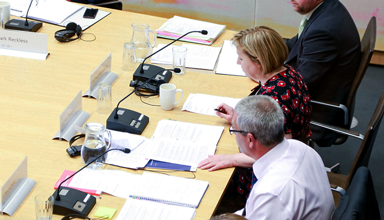Higher education providers and statutory services in Wales should work together to ensure a consistent level of mental health support to ensure every student is able to get the best out of their education.
Top of the priority list for Welsh Government must be the developing of a shared understanding between education providers, healthcare providers and the Welsh Government about the roles and responsibilities for student welfare. There will need to be a bespoke approach to take account of different types of providers, diversities of student populations, and the differing health boards, this should set out some basic principles underpinning who is responsible for what levels of support.
A common framework across the higher education sector should be developed as a priority, says a Senedd Committee, to set a shared expectation of support tailored to the specific and unique needs of the diverse student population and the institutions they attend.
This is one of the recommendations of the Senedd’s Children Young People and Education Committee report published today (Wednesday 29 March 2023) following their inquiry in to the effectiveness of mental health support in higher education settings in Wales.
There is often a range of factors that can lead to mental health issues for students. Issues such as the pandemic and cost of living pressures affect us all, but people in higher education face particular challenges which can be unique to the student experience. Student’s mental health can be vulnerable to a number of different factor.
International students will face different pressures to others, whilst those on placements in health and social care will require another level of support. Consideration should also be given to the needs of students from care experienced backgrounds, or those who already experienced mental health problems before embarking on their higher education journey.
Whilst all Welsh universities are signed up to Universities UK’s Stepchange and Suicide-Safer Universities framework, and all Welsh higher education providers must have a student charter, but beyond that there is no set standard for mental health and wellbeing services. And with students presenting with such a wide range of challenges, it’s important that the level of care is available and appropriate for everyone.
Chair of the Senedd’s Children, Young People and Education Committee, Jayne Bryant MS says:
“Currently there is no set standard for mental health and wellbeing services in higher education. Whilst recognising the increasingly diverse population of students, and range of external factors that can impact on their health and wellbeing, the Committee is of the view that there should be a consistent standard of expectation for all students.
“Going to, and studying at university is exciting and can be life-changing. For many students their experiences are positive. But for others they may find times when they struggle with their emotional and mental well-being.
“Everybody we spoke to during this inquiry was clear of the scale of the problem, and the importance of getting the support in the right place at the right time. We hope that our report and the 33 recommendations will help ensure that no-one is denied their chance to realise their potential whilst at university because of their mental health.”
High praise for Cardiff pilot support scheme
A pilot scheme at Cardiff’s universities is held in high praise by the Committee for the way it is meeting the needs of students who might have previously missed out on the right type of mental health support.
The Mental Health University Liaison Service (MHULS) pilot was established in April 2022. It provides support for students in the Cardiff and Vale University Health Board area, covering Cardiff University, Cardiff Metropolitan University, University of South Wales, and the Royal Welsh College of Music and Drama.
The pilot is aimed at students with moderate mental health problems or more complex long-standing mental health issues. It is staffed with NHS staff who are based within student support services on campus and aims to bridge the gap between support provided by providers, and the threshold to accessing NHS services. The key to its effectiveness is establishing working partnerships between the education and healthcare sectors in order to provide seamless mental health support to students.
In the first six months of the pilot, it has seen over 200 mentally unwell students and around 18% of referrals have been “category D”. These will be people are who not actively about to harm themselves, but certainly living with complex and complicated mental health issues.
The evidence the Committee received showed signs that the scheme is working well and, subject to a full assessment being completed, the Committee supports a full-roll out of the model across Wales. Supported by long term funding committed to its development and maintenance, a roll out across institutions would go a long way to address many of the recommendations in the Committee’s report.
Chair of the Senedd’s Children, Young People and Education Committee, Jayne Bryant MS says:
“We have been impressed with the evidence we have heard how students in Cardiff are benefiting from the MHULS pilot. This scheme shows how building relationships between education and healthcare sectors will hopefully reduce the risk of some students falling between gaps in service provision. Early signs are incredibly positive and we think it is imperative that this opportunity is seized and a wider roll-out across Wales is supported.”
The report contains 33 recommendations for Welsh Government, and how it should work with HEFCW and the incoming Commission for Tertiary Education and Research to meet the needs of Wales’ higher education students.
They cover a wide range of issues such as the impact of pandemic, mitigating the impact of the cost of living crisis; improved data collection; better information sharing; training and awareness raising for staff and students and more sustainable funding which matches the level of need.
The report will now be sent to Welsh Government for its consideration.






